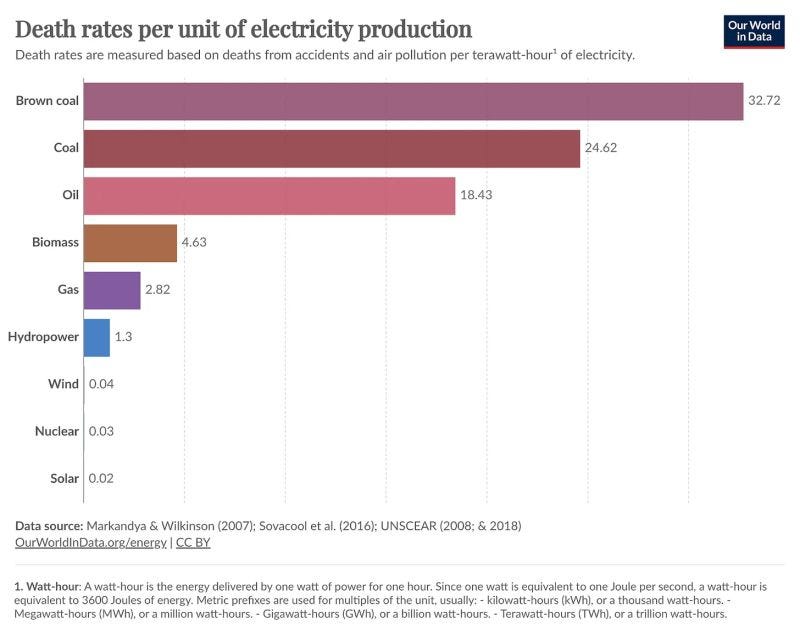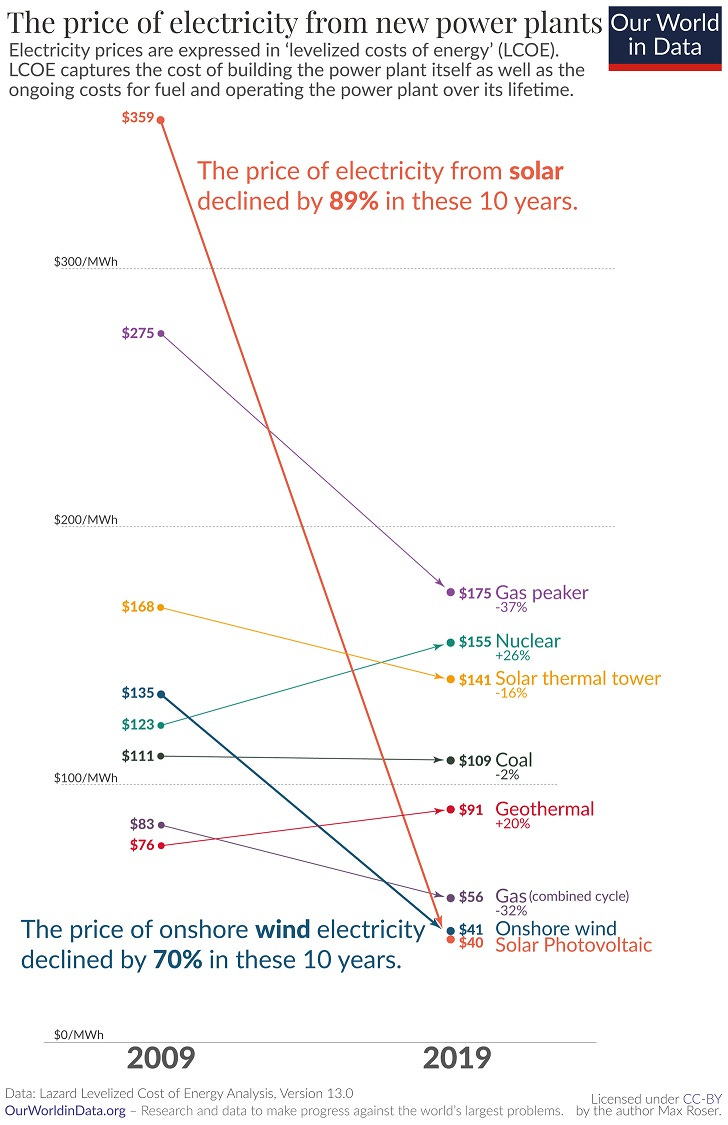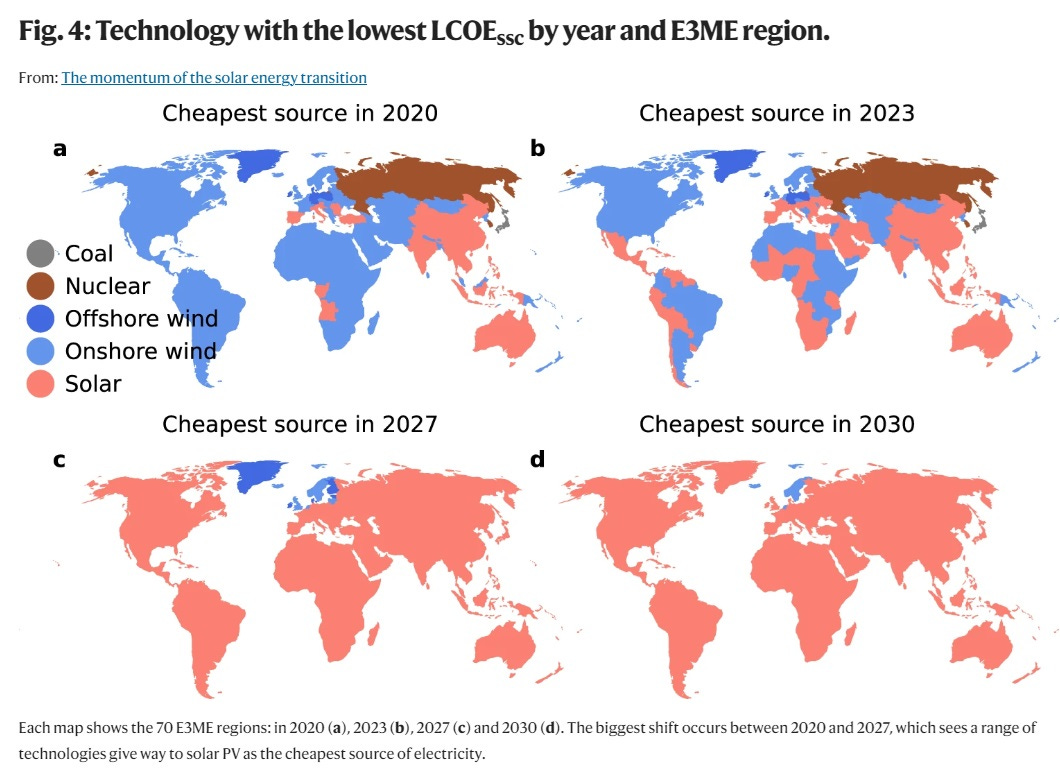Climate change: how we could avoid disaster quite easily through progress
Nuclear energy's continued revival, solar's unstoppable rise and the no-brainer that is solar geo-engineering. Fuck degrowth! Donate to progressive solutions!
After Microsoft announced they’ve committed to buying up all the nuclear energy coming out of the reopening of the Three Mile Island reactor, Google and Amazon have now announced they are also investing in Nuclear after Microsoft: Google, Amazon. The obvious reason is the expected growing energy requirements of AI.
I’m pretty excited about this. I believe that humanity’s decision to basically stop building nuclear after the 70s is one of the biggest mistakes we ever made. It has caused us to slow down progress in every technology except information technology and has resulted in the world being too reliant on fossil fuels for far too long. It’s hard to find any other choice that has contributed more to climate change than our decision to reject nuclear energy.
Uranium contains 160,000x as much energy per kg as coal. Getting this energy out is pretty efficient with current technology: 1 kg of coal creates 8 kWh of heat, and 1 kg of Uranium (at 3.5% enrichment) will create a ridiculous 840,000 kWh!
The bottom-line is that you'll need about 2.5 kg of Uranium to power your entire life. Uranium is extremely heavy, by the way. A kg of Uranium is about the size of a golfball. So all the Uranium (and hence nuclear waste) you would generate over a lifetime if 100% of the power you used came from nuclear, would be about the size of two golfballs.
Nuclear reactors are still very expensive to build. But reopening existing reactors like Three Mile Island looks like a no-brainer. And let’s not even speak of the monumentally stupid decision Germany made to close down perfectly functional reactors to use more….coal and gas. 10% of German energy still came from coal in 2023, and that is expected to grow in 2025. 🤦🤦🤦🤦
By the way, open coal mines like this are more radioactive than a nuclear waste storage. If Germany had just kept it’s nuclear reactors open, it would have almost eliminated coal by now, reducing CO2 emissions, radioactivity, and reducing the size and environmental impact of open coal mines. Nuclear is clean, safe, and while radioactive waste management is a legitimate concern, it is not as big a problem as people think it is. Mostly because there is just not that much waste.
So it has been really, really unfortunate that we didn’t get the most out of nuclear. It would still be good to build more (small modular) nuclear capacity, but whether nuclear is an important part of our future, is up for some debate. It’s now more and more clear that solar is the real future.
The incredible solar revolution
Solar power has become so cheap, so unexpectedly fast that it might not matter anymore whether or not we solve the regulatory issues around nuclear. Solar energy has beaten even the most optimistic forecasts time and time again. There has been a learning curve effect unlike any other energy generation method ever invented.
In a few years, solar will be the cheapest form of energy pretty much everywhere in the world. It will be impossible for even the staunchest fossil fuel boosters to turn the tide. The powerful force of capitalism will do the rest and make the transition to abundant clean energy unstoppable.
I cannot reiterate enough how cool it would be if we could build massive amounts of clean energy. Imagine if everyone can have clean energy at something like 0.0001 USD per KWh (current price ~0.15).
We could have 5 minute washing machines. We could make far more powerful computers just by making them bigger. We could create fuel for airplanes out of thin air by using electricity to pull CO2 from the sky and turn it into fuel1. We could travel everywhere within 3 hours, and do so without climate guilt.
By 2100 we could end up in a situation where we need to put some CO2 back into the atmosphere because we have turned too much of it into stuff. That’s a story of progress that I’ve fallen in love with, and it sounds impossible. And maybe even shameful to millennials like me who grew up with ever more dire climate change prospects and relentless propaganda that reducing consumption is the only solution.
Progressive solutions
The climate activism I grew up with has lost the plot. Greenpeace continues to push an anti-nuclear agenda with all kinds of bogus arguments. They are also staunchly against genetic engineering, and their unfounded campaign to ban Golden Rice is likely to cause 10s of thousands of children to die needlessly2. In at least both of these cases, Greenpeace stubbornly persists in the face of overwhelming scientific evidence that they are wrong. Their arguments quite obviously work backwards from a predetermined conclusion (humans bad). They are really holding back progress, and have become enemies of the planet they so dearly try to protect. And why? I really don’t know… But I do know that I find the golden rice example in particular deeply infuriating.
But thankfully there are other options out there to donate to!! It’s taken me a while to find them, but I’ve been donating to two climate related organization:
WePlanet is a modern day Greenpeace that is not technophobic. They have successfully petitioned the EU to include nuclear in their clean energy agenda, and have been debunking Greenpeace’s nonsense left and right. They back using modern gene editing and other farming technologies to increase welfare, drastically boost yields while reducing pesticide and fertiliser usage, so we can get all our food from a fraction of the current land. This would create the opportunity to re-wild 50-75% of farm land globally.
This is a new kind of environmentalism. Our motto is 'Liberate nature, elevate humanity'. Instead of austerity, we aspire to an environmentally sustainable abundance. We want to see animal products replaced with alternative proteins to spare land for rewilding and ecosystem restoration, and to reduce emissions from livestock. We want to see a huge upscaling of clean technologies to achieve zero carbon energy abundance. We support equitable development in the Global South, from clean cooking to food security to universal electrification. We see the potential for a sustainable green future to be more economically prosperous and equitable.
Make Sunsets is an organization that deploys sun-reflecting clouds in the stratosphere, inspired by the naturally cooling effects of volcanic eruptions. This whole thing is super cool, and Greenpeace obviously hates it (human intervention = badddd). But the science checks out. We can lower temperatures and reduce droughts, floods, fires and extreme weather quickly and economically. For a detailed breakdown of how the technology works, read this. But I can summarise it briefly:
If we release just 2 million tons of SO2 per year where it matters in the stratosphere, we could offset the warming effect of our entire 2 trillion (2 million million) tons annual carbon emissions.
This amount is just a 2% increase over the current total SO2 emissions in the world.
The pros and cons have been studied very carefully over decades. Among scientists, there is not much debate about this. This will work very fast. We should be noticing temperature reductions within 6 months. This all sounds like such a complete no-brainer to me, that I’m upset it doesn’t get more traction. By doing this we can buy much needed time for the energy transition to progress.
And that is exactly the point that leads to the most commonly cited counter-argument (Greenpeace and Greta Thunberg): If it works, that would be very bad, because it would reduce the urgency to solve the ‘real problem’ (humans and capitalism = bad).
I don’t hate many things, but I really dislike ‘de-growth’ environmentalism
As a progressive, center-left optimist, I found it incredibly hard to understand why someone would make an argument like the one Greenpeace and Thunberg make against solar engineering. Learning more about the ‘degrowth’ ideology taught me what’s going on. Degrowth is an activist agenda, which is anti-human, anti-technology, and maybe most of all anti-capitalist. At it’s most extreme, degrowthers have proposed that we should reduce the population (who? and how?), or that we should all start doing laundry by hand.
The Manifesto for a post-growth economy that was the at the center of the Beyond Growth conference in Europe starts with “Capitalism is at the center of a raging eco-social crisis, that will continue to develop in the pursue of limitless economic growth in a finite planet, at the expense of all living creatures and the environment.”
It lists as ‘solutions’ empty slogans like: “Policymaking priorities need to shift towards wellbeing and social services.” and “We need to fundamentally rethink our financial-monetary system.” What? And how? Shouldn’t we expect people who propose a radical teardown of the current ‘system’ to submit a solid policy plan before hand? From Jeremiah Johnson we get the no punches pulled take, with several good links if you want to dive into the economics and policy problems here:
Degrowth is a fringe ideology focused around the idea that economic growth is a destructive force that must be curtailed if we’re going to prevent climate change and ecological catastrophe. Degrowth is a profoundly stupid idea. It’s the antivax movement of political economy - you forget how bad the previous world was and come out against modernity because of that. I won’t spend that much time spelling out why degrowth is stupid, but here are several good explainers if you really want to dive into those arguments.
The central tennet of degrowth is that growth is fundamentally unsustainable, therefore it must stop and we must reduce our living standards. Woah woah woah sir, hold on a second. Why don’t we just keep growing everyone’s standard of living while using less resources? Degrowth activists will claim that this ‘decoupling’ of economic growth from resource use is impossible, but that is very obviously not true. Plenty of countries have been able to do this successfully in the last 20 years.
This decoupling is only accelerating thanks to further technological progress that allows us to do more with less. So the first reason to reject degrowth ideas is that we simply don’t need it. We don’t have to sacrifice our living standards to save the planet. We can save the planet and continue to improve our lives.
The second reason is that there is simply not enough money, even now. If we were to freeze the economy at its current level, average income per person would remain at ~17,000 USD per year. So, how are we going to distribute this? Unless we want to condemn the 25% of the world population who earn less than $2.90 per day to abject poverty forever, all rich people would have to come down to the average. Apart from the small challenges of executing a central planning exercise of this magnitude, and the utter impossibility of getting countries like China to play along, this is a political non-starter even in Western Europe. How would we convince 86% of the population to take a massive hit to their quality of life? It would also probably lead to a total collapse of society. Without enough money to sustain healthcare, education, transportation and industrialized food, what would happen? Are we going to have happy chitchats while doing our laundry by hand or would there be looting and plundering over the last remaining pack of Snickers?
If some rich countries simply decided to stop growing unilaterally, it would achieve nothing, because decoupling has already progressed so far that most emissions are currently coming from emerging markets.
So, how can there possibly be any other conclusion than that degrowth is both pointless and unnecessary? Our best chance to save the planet is to go forward. We have to embrace nuclear, at least for the time being, do what we can to stop warming in the short term, and continue to subsidise and push for renewable energy and decarbonisation of the economy, i.e. continued and accelerating decoupling.
That was my rant of the week. Fuck degrowth!
Donate:
We Planet
Make Sunsets
How does it work and why would we want to do it: When you burn the simplest fuel, Methane (CH4), it reacts with Oxygen (O2) to become CO2 and H20, releasing a bunch of energy in the process. With abundant electricity you can run the process in reverse, pulling CO2 and water vapour from the air and turning it into CH4. Why do that? It looks quite likely that airplanes and rockets won’t be able to fly on battery power for a very long time due to weight.
Golden Rice is a genetically modified rice grain that contains Beta-Carotene, the critical precursor for human bodies to make Vitamin A. The rice was developed to counter Vitamin A deficiency, which kills >100,000 children per year according to the WHO. Of course Greenpeace was instrumental in banning Golden Rice, despite receiving an open letter from over 150 Nobel Prize laureates to persuade them of Golden Rice’s importance. Greenpeace’s efforts are likely to cause 10s of thousands of children to die. I find that infuriating.










